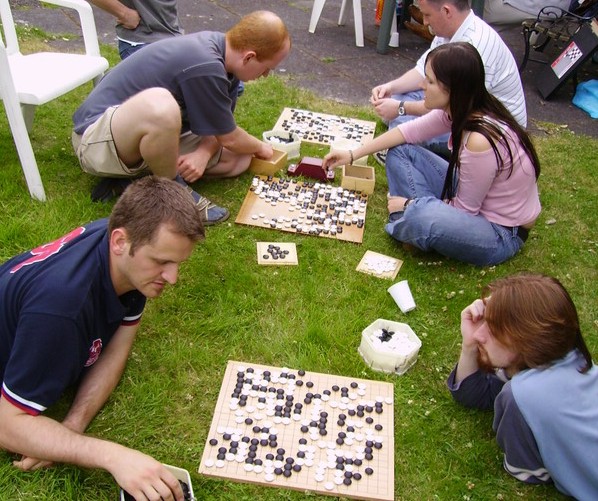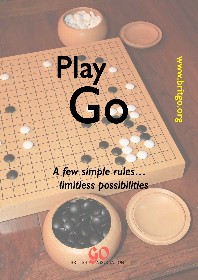Why is Go Special?
Go is unique among games
The history of Go stretches back some 3-4,000 years and the rules have remained essentially unchanged throughout this very long period. The game probably originated in China and the future of Tibet was once decided over a Go board when the Buddhist ruler refused to go into battle; instead he challenged the aggressor to a game of Go.
In the Far East, where it originated, Go enjoys great popularity today, and interest in the game is growing steadily in Europe and America.
Like Chess, Go is a game of skill - it has been described as being like four Chess games going on together on the same board - but it differs from Chess in many ways. The rules of Go are very simple and though, like Chess, it is a challenge to players' analytical skills, there is far more scope in Go for intuition.

Go is a territorial game. The board, marked with a grid of 19 lines by 19 lines, may be thought of as a piece of land to be shared between the two players. One player has a supply of black pieces, called stones, the other a supply of white. The game starts with an empty board and the players take turns, placing one stone at each turn on a vacant point. Black plays first, and the stones are placed on the intersections of the lines rather than in the squares. Once played, stones are not moved. However they may be surrounded and so captured, in which case they are removed from the board as prisoners.
The players normally start by staking out their claims to parts of the board which they intend eventually to surround and thereby make into territory. However, fights between enemy groups of stones provide much of the excitement in a game, and can result in dramatic exchanges of territory. At the end of the game the players count one point for each vacant intersection inside their own territory, and one point for every stone they have captured. The one with the larger total is the winner.
Capturing stones is certainly one way of gaining territory, but one of the subtleties of Go is that aggression doesn't always pay. The strategic and tactical possibilities of the game are endless, providing a challenge and enjoyment to players at every level. The personalities of the players emerge very clearly on the Go board. The game reflects the skills of the players in balancing attack and defence, making stones work efficiently, remaining flexible in response to changing situations, timing, analysing accurately and recognising the strengths and weaknesses of the opponent. In short, Go is a game it is impossible to outgrow.
What makes Go extraordinary?
As an intellectual challenge Go is extraordinary. The rules are very simple, yet it resists all attempts to program computers to play Go. Even the best programs, the results of many years development, are still beaten by experienced players. Apart from a chance to beat the computer, Go offers major attractions to anyone who enjoys games of skill:
- There is great scope for intuition and experiment in a game of Go, especially in the opening. Like Chess, Go has its opening strategies and tactics but players can become quite strong knowing no more than a few basic patterns.
- A great advantage of Go is the very effective handicapping system. This enables players of widely differing strengths to play each other on equal terms without distorting the character of the game.
- The object in Go is to make more territory than the other player by surrounding it more efficiently, or by attacking the opponent's stones to greater effect. On such a large board, it's possible to do somewhat badly in one area but still to win the game by doing better on the board as a whole.
- Every game of Go quickly takes on a character of its own - no two games are alike. Since a player needs only to have more territory than the opponent in order to win, there are very few drawn games, though the outcome may hang in the balance until the very end.
NEXT: A Brief History or How to Play

This page is part of the online version of our Play Go Leaflet.
If you have any comments, please email the webmaster on web-master AT britgo DOT org.
